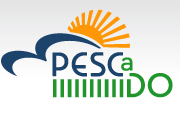Reasoning and user tailored decision support
The overall objective is to develop environmental ontology reasoning and user-oriented decision support techniques for activities influenced by environmental conditions. This objective translates into the following more concrete goals: (i) to develop a flexible problem/decision support request description language which combines restricted format input elements with natural language; (ii) to develop ontology-based reasoning techniques for the deduction of the appropriate reactions to the system and users’ requests; (iii) to develop techniques for the selection of the content to be communicated to the user.
In the first phase of the project, the PESCaDO Problem Description Language (PDL) has been developed. The PESCaDO PDL is the formalism used to represent, in a machine processable format, the users’ decision support requests to be submitted to the PESCaDO system. The language is based on OWL, the state of the art Semantic Web ontology language, and it is one of the relevant parts of the PESCaDO ontology. The PESCaDO PDL consists of three main components: the type of request, the type of activity to be performed by the user/users, and profile of the user/users involved in the request. Here below is an excerpt of the hierarchy of classes describing activities and user requests:
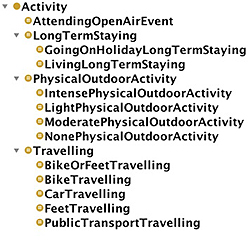
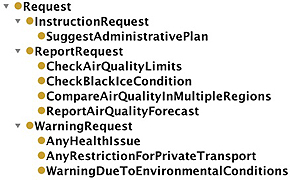
A problem description is a set of ontology individuals instantiated according to the classes and mutually related according to the properties defined in the PESCaDO PDL. For instance, for the user problem: I want to go hiking with my son in Espoo this weekend: is there any environment-related health issue for us?”, the following problem description is generated:
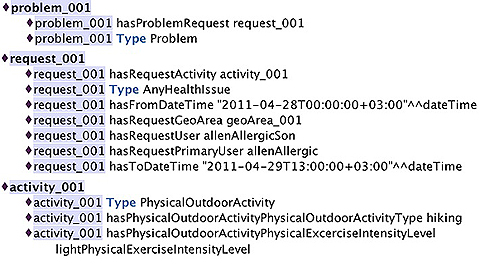
A further contribution has been the design of the content selection strategies relating a problem description, formalized according to the PESCaDO PDL, with the type of environmental data that are relevant for fulfilling the users decision support request. These strategies, developed in collaboration with environmental domain experts and health domain experts, exploit the ontological nature of the PESCaDO PDL and the content formalized in the PESCaDO ontology: indeed, these strategies are specified in terms of OWL axioms, the consequence being that content selection is done via ontology reasoning. WP5 also contributed with a service (Related Aspect Computation Service) of the PESCaDO system implementing the designed content selection strategies.
Finally, we developed the reasoning strategies providing user tailored decision support. After a first analysis of the kind of reasoning and content to be produced (e.g. suggestions, recommendations, warnings, correlation between facts) according to the user needs and the use cases considered, a full suite of reasoning strategies have been produced combining several complementary techniques: to name a few, querying of the PESCaDO Knowledge Base, ontology reasoning, fuzzy reasoning, and procedural computations. In particular, fuzzy reasoning allow us to reason in terms of imprecise concepts, whose meaning is inherently vague and depends on subjective perception. Mild summer temperature in Finland is one of such imprecise concepts (or “fuzzy sets”). The “membership” of a given temperature in the fuzzy set mild summer temperature in Finland is calculated by a membership function illustrated by the following picture:
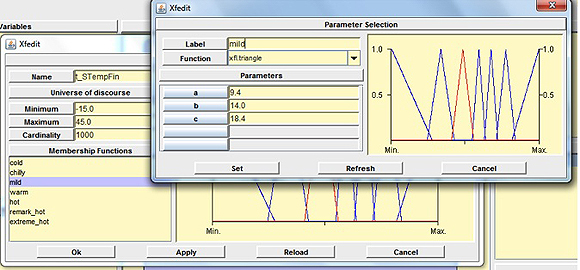
The interpretation of the function goes as follows: When the summer temperature is (more or less) between 10 and 18 we call it mild; close to the left border of this interval it ranges between chilly and mild, while close to the right border it ranges between mild and warm; around the middle of the interval the “mildness” of the temperature is maximal, with the value of membership function close or equal to 1.
Our future work will investigate how to improve and extend the content selection and reasoning strategies developed so far. Among the directions we are considering, we plan to enhance the reasoning strategies to better exploit the information available in the PESCaDO Knowledge Base about the uncertainty of data (e.g. on forecasted data) and the reliability of environmental service nodes.
CONTACT:
Luciano Serafini <serafini@fbk.eu>
Marco Rospocher <rospocher@fbk.eu>
